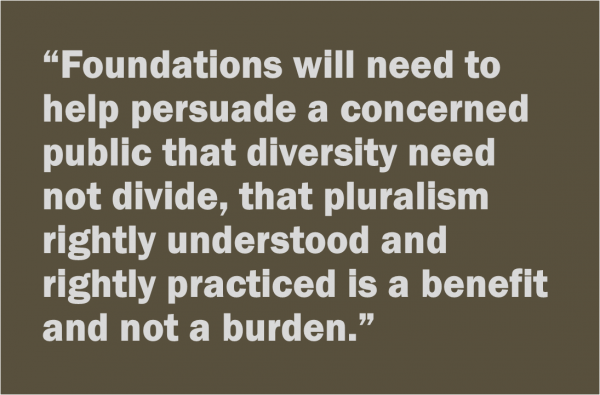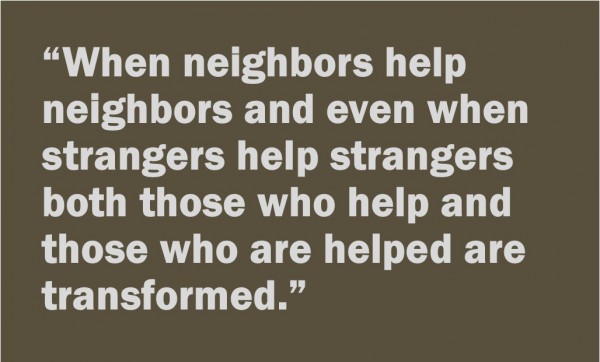PERSPECTIVE: The Challenge of Philanthropy - Anxiety, Alienation and Adversity
/by Ambassador James A. Joseph, President Emeritus, Council on Foundations When I think about philanthropy in a badly divided nation and a badly divided world, I am reminded of what Scott Peck, the psychiatrist and noted writer said some years ago. He wrote that we build community out of crisis and we build community by accident but we know very little about how to build community by design. I would like to offer three observations about building community by design.
The first is the need to reimagine and reaffirm the centrality of community in the American narrative. I first became involved in organized philanthropy as an executive and a trustee a little more than fifty years ago. It was a time when Alexis de Tocqueville was the most quoted, but probably the least read, of our literary legacies. The public discourse about community centered on the civic habits of early Americans and how social cohesion was established and sustained by the coming together in local groups to promote the common good. It was a time when neighbors came together to help build each other’s barns and to take in the crops before the rains came.
In recent years, however, a second concept of community has competed for primacy in the American story. It emphasizes the centrality of the individual and romanticizes the lone ranger who conquered a hostile environment. A primary calling of leaders in the philanthropic sector, as well as policymakers and opinion leaders, is to help get the narrative right; to help bring back into balance the legitimate romance of rugged individualism with the equally legitimate effort to form communities where individuals embrace, reaffirm and take responsibility for supporting and promoting a common good.
I like the concept of community I encountered in Southern Africa in the 1970s. It had its genesis in the Xhosa proverb “People are people through other people.” It was not “I think, therefore, I am” but “I am because you are.” I am human because I belong. I was made for community, so If I deny your dignity I deny my own. If I diminish your humanity I diminish my own. The early warring tribes in Southern Africa had war healers who came together after a conflict to plan initiatives to ensure that both the victor and the victims were restored into full standing in the community. It was said of Mandela’s ancestors that they had a short memory of hate.
When we are able to say that people are people through other people we are more likely to make the condition of others our own. It has been my experience that when neighbors help neighbors and even  when strangers help strangers both those who help and those who are helped are transformed. When that which was their problem becomes our problem, the connection that is made has the potential for new forms of community. In other words, when you help someone who is homeless to find a home, when you help someone who is hungry to find food, when you help someone to find meaning in a painting or sculpture, when you help someone to fight bigotry or to find a job, you will be laying the groundwork for the genesis of community.
when strangers help strangers both those who help and those who are helped are transformed. When that which was their problem becomes our problem, the connection that is made has the potential for new forms of community. In other words, when you help someone who is homeless to find a home, when you help someone who is hungry to find food, when you help someone to find meaning in a painting or sculpture, when you help someone to fight bigotry or to find a job, you will be laying the groundwork for the genesis of community.
But while providing help can lead to a deeper connection, I must also caution that while charity is good, justice is better. One involves ameliorating the consequences of deep social ills. The other involves eliminating the cause and is likely to be more enduring. Let me provide an example of why I make this distinction. When we think of helping those in need, we often think of the Good Samaritan who encounters someone badly beaten on the side of the road and stops to give aid. But I ask you to imagine what the response would be if he travelled the same road every day and on each day he found someone badly beaten at the same location on the side of the road. Wouldn’t he be obliged to go beyond charity to the kind of strategic intervention that asks who has responsibility for policing the road? Charity is good, but justice is better.
My second observation is that foundations will need to help demonstrate that the fear of difference is a fear of the future. They will need to help persuade a concerned public that diversity need not divide, that pluralism rightly understood and rightly practiced is a benefit and not a burden. All of us will need to be reminded that when those who wrote the American constitution committed us to forming a more perfect union they realized that their initial work was neither fixed nor final. They understood that the American society is a community that is always in the making. Yet, it is this remaking of America that is causing great anxiety and even fear.
This conference comes at a time in which the fabric of American life is being torn apart by passions that seem almost out of control. We talk about forming a more perfect union, but the more interdependent we become, the more people are turning inward to smaller communities of meaning and memory. It is increasingly true in many parts of the United States that if you ask someone to step back and imagine what it means to be an American, they will not think of my face or even the face of our president. They will think of someone in whose image they see themselves; someone who fits their comfort zone; someone who looks like them, talks like them and thinks like them, that is, if they think at all.
Our challenge as we look at the passions that have been aroused around us, and often within us, is to help ensure that we do not misunderstand what divides us or misdiagnose the pathology that disturbs us. I am persuaded as I travel around the country that the emotions on display have at least three dimensions: anxiety, alienation and adversity; and that building and sustaining community will require that we recognize the distinctiveness of each of these emotions and develop strategies to respond to the cause of each.
__________________________________
Ambassador James A. Joseph is professor emeritus of the Practice of Public Policy at the Sanford School of Public Policy at Duke University. The president of the Council on Foundations from 1982-1995, he has served in senior executive or advisory positions for four U. S. presidents, including Undersecretary of the Interior for President Jimmy Carter and Ambassador to South Africa for President William Clinton. His most recent book is “Saved for a Purpose,” published by the Duke University Press. This piece is excerpted from his keynote address delivered at the Connecticut Council on Philanthropy annual Luncheon and Conference on May 13, 2016. ©
Part II of Ambassador Joseph's remarks will be published next Sunday in perspeCTive.






























